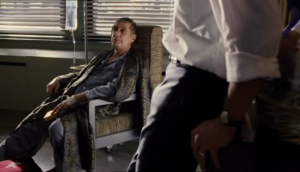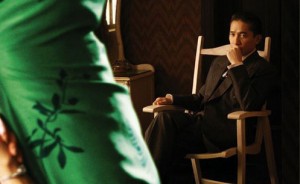The Best Shot of Angels in America
I’m sorry, I couldn’t resist. When that topmost shot appeared, it instantly triggered the latent Lust, Caution part of my brain. Not to suggest that Roy Cohn (Al Pacino) and Joe Pitt (Patrick Wilson) share an… acrobatic relationship like Mrs Mai and Mr Yi’s, of course, but they are quite similar in other ways:
The title Lust, Caution fits their situation aptly. In Angels in America‘s multi-protagonist narrative, Roy and Joe take the parts of conservative, anti-gay Republicans forced to face up to the realities of the people they’ve demonised: Roy contracts AIDS through one of his illicit, off-screen encounters, while Joe finds himself losing the battle against his desire. Playwright Tony Kushner, who adapted his own script for the screen, conjures a few other such doublings across political lines. By this point, Joe has fallen for and cohabited with his out gay co-worker Louis; both have spurned their lovers of a few years for each other. The spurned lovers, Joe’s wife Harper and Louis’ ex-boyfriend Prior, meet via some sort of arcane telepathic corridor, and acknowledge that they signed into their failed relationships mostly due to erotic attraction. And both Prior and Roy, stricken with AIDS, start having rather different visitations upon them of an afterlife-y sort.
They’ve made their choices about power. The framing says it all. Roy, like Mr Yi, has sold out to power; Pacino’s casting and throne-bound posture even recall his role in The Godfather trilogy. At the end of the first chapter, Roy explains his denial in an unassailable speech about what labels mean:
Roy: Your problem, Henry, is that you are hung up on words. On labels. That you believe they mean what they seem to mean—AIDS, homosexual, gay, lesbian, you think these are names that tell you who someone sleeps with? They don’t tell you that. No. Like all labels they tell you one thing, and one thing only: where does an individual so identified fit into the food chain, the pecking order? Not ideology or sexual taste, but something much simpler: clout. Not who I fuck or who fucks me, but who will come to the phone when I call, who owes me favors. This is what a label refers to. Now to someone who does not understand this, homosexual is what I am because I have sex with men, but really this is wrong. Homosexuals are not men who sleep with other men. Homosexuals are men who in fifteen years of trying cannot get a pissant anti-discrimination bill through city council. Homosexuals are men who know nobody, and who nobody knows. Who have zero clout. Does this sound like me, Henry?
By contrast, Joe has declared his love for Louis—”I’ll do anything”—in a scene that I’m sure will feature in today’s instalment of the Hit Me with Your Best Shot series. Which, given Roy’s worldview, explains why Joe’s head and shoulders are cropped out of the shot, his body reclined in a submissive pose. I’ll confess that, this framing aside, I wasn’t too impressed with the directorial choices Mike Nichols made in this HBO adaptation. Most of its six hours look like he plonked a camera in front of the actors, cut with the occasional helicopter footage, and the live special effects and rousing split-staging of the play simply become standard CGI/wire tricks and cross-cutting on film.
And they’re the affective MVPs of their movie. I wish I liked Meryl Streep or Emma Thompson better in this, much as I often love them as actors and (more so) celebrities. But I rarely appreciate Meryl’s work when her characters aren’t loose and funny; they hamper her natural gifts, and she always looks clenched and uncomfortable playing them. What exacerbates this is Nichols’ decision to have her play each of her multiple roles (Meryl has three: a Mormon mother, a Jewish rabbi, and the ghost of Ethel Rosenberg) as more realist than drag. Whereas Emma’s roles—punkish nurse, toothless hobo, clueless angel—seem more like stunt casting than anything else, especially since Nichols doesn’t let her look remotely ethereal as the angel. The other leads—Mary-Louse Parker, Jeffrey Wright, Ben Shenkman and Justin Kirk—turn in, for me, mostly perfunctory readings of the material.
Perhaps what ingratiates me to Pacino’s and Wilson’s characters is that, as a liberal, I find myself more fascinated by their perspectives. Though I’m open to the criticism that these are “conservatives for liberals”, types made for our consumption rather than honest representations. But what fighting types! Pacino sinks his teeth into Cohn, and Patrick Wilson gives, for me, the most lived-in repressed gay performance of the last decade, beyond even stalwarts like Ledger and Firth.



